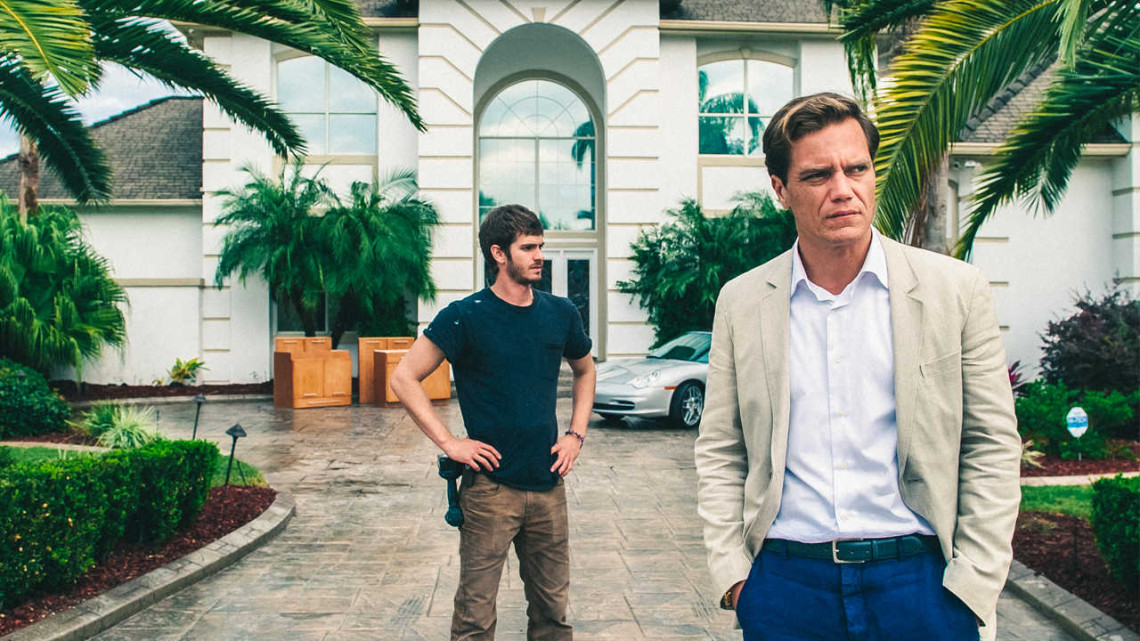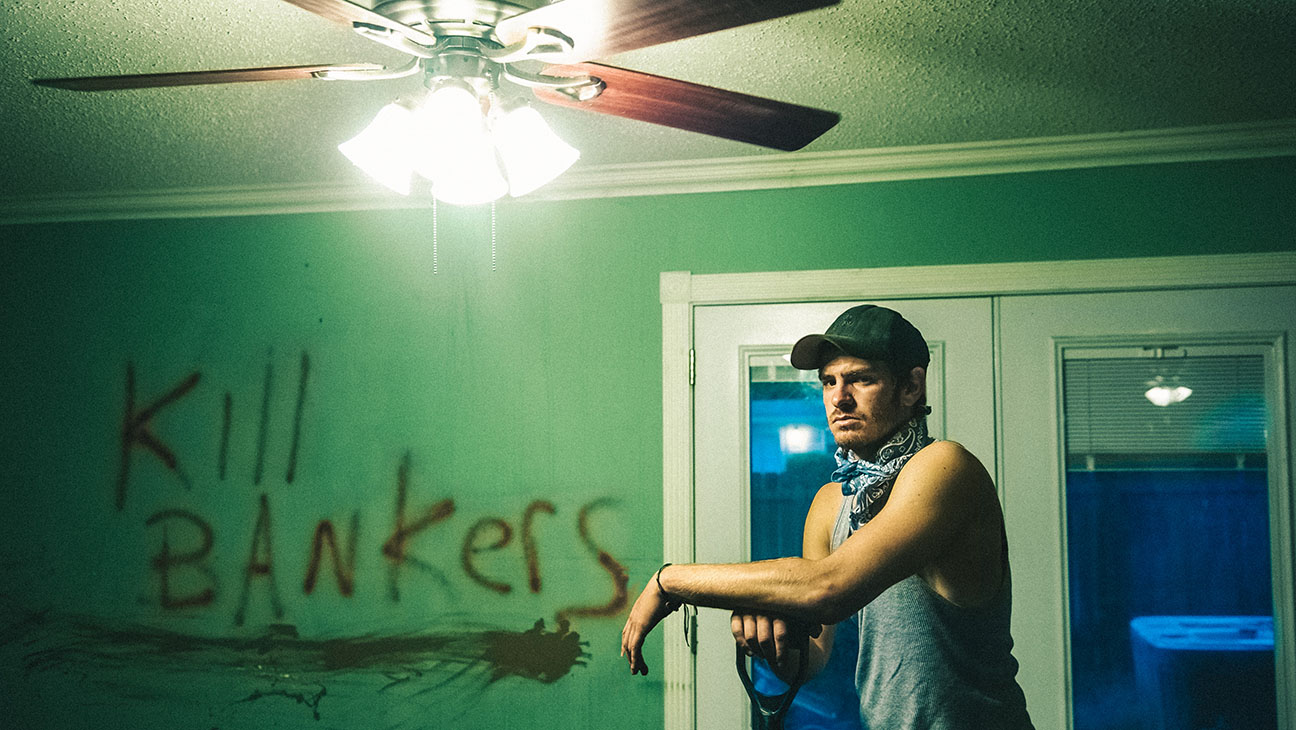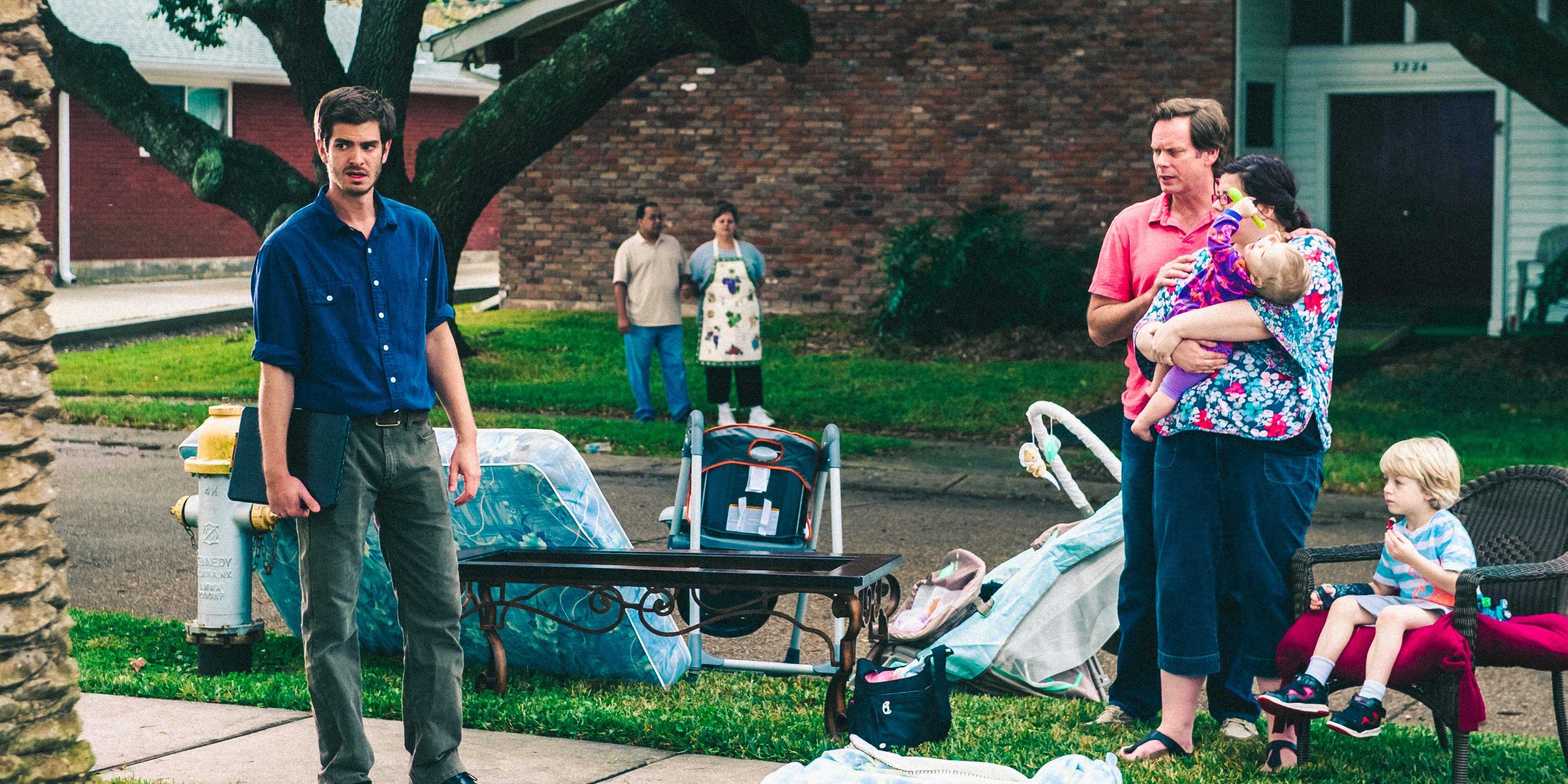American independent filmmaker Ramin Bahrani’s past works (Man Push Cart, Chop Shop, Goodbye Solo, etc.) show a keen eye for observing the social problems associated with capitalism. Iranian in origin and with an interest in Iranian cinema, Bahrani’s work shows a great tendency toward naturalism and the observation of ordinary life, although he never rejects fiction in favor of realism and it is difficult to describe his movies as down to earth takes on reality. His latest movie is 99 Homes, which screened in 2014 at the Toronto International Film Festival (TIFF) and was well received. Movie Mezzanine spoke with Bahrani before the US release of 99 Homes, where we also discussed Iranian background and its influence on his work.
MOVIE MEZZANINE
What was the source of your inspiration for this movie?
RAMIN BAHRANI
The whole world was turned upside down in the housing crisis and I was very curious about how that happened, so I started reading articles and books. I had hundreds of them in my home in Brooklyn, but I really wanted to get down on the ground. There were four states that were the epicenters of the crash. Florida was one of them, so I just went down there and started meeting people who were actually living through what I was reading about. I wanted to go beyond statistics and into real people’s lives. I found an opportunity to connect to the person who was doing evictions on behalf of the banks and the government. This was someone who actually got people removed from their home. I found a way to connect with people that just seemed like a very, very strong structure to tell the story on a human level as opposed to a statistical one—or the versions that we tend to see which are about the people on Wall Street making tons of money on the backs of everybody else. I thought it would be good to go down to the street level and see what was happening to people.
MOVIE MEZZANINE
I watched this movie in 2014 during TIFF, but it took about one year for the movie to get a US release. Why did that take so long?
RAMIN BAHRANI
It’s pretty simple. The distributor that bought the film was a new company called Broad Green. At that time, they had only five employees and now they have a hundred. It’s becoming quite a large studio now but this was the first film that they had bought so it took them 6 or 7 months to get the company cooking. We had to wait for them to be ready to release the film; that’s really the only reason. Now they’ve released a lot of other films, like A Walk in the Woods.
MOVIE MEZZANINE
You cast Michael Shannon in this film. In his previous works, he played simpletons, or twitchy weirdos living on the margins of society. You defined a new character for him—sort of an evil character. Was this a difficult process?
RAMIN BAHRANI
Yes. We thought about it and wanted to play against his usual roles. I wanted him to be very handsome in the film. I wanted him to have very slick suits. Actually, after he was cast, I started writing lots of dialogue for him. I came to learn that he has a very good sense of humor; it’s very sarcastic and dark, so I started adding that into the script. A lot of that was to play against the norm and have him do something he had not done before, which was to be seductive, talkative, and very intelligent. Michael is one of the top five actors in the world and I had wanted to work with him since I met him in 2009. Even now, I have so many projects that I want to do with Michael. He was able to bring a whole other layer of elements into the character other than the hidden proposition—which he’s very good at in conversation. He’s very cunning in his conversation; he’s very poignant and was also able to bring a deep sadness to the character because he understood that the real force of evil in the film was the system of which his character was a part.
Michael understood how lonely his character was and that he needed somebody like Dennis [played by Andrew Garfield], though it could have been anyone else. Dennis is prepared to go to great lengths to get a job and to make money. He’s a natural leader of men, as seen in the sewage health scene. Michael responds to that but if it hadn’t been Dennis, then within a couple of weeks, he would have found another person like that. He needs somebody like that to talk to, to be around, and also to justify his behavior. I think somebody like that could become his partner. He would be able to get through the day a little bit easier, if you know what I mean.
MOVIE MEZZANINE
Dennis has kind of Michael Corleone characteristics at the beginning. He’s not very interested in what he’s doing, but as the movie goes on, he becomes very interested in the job. I’m just curious to know if you have any thoughts about the psychology behind this character. Why did he accept this position?
RAMIN BAHRANI
Yes, yes. Well, it’s different from Michael Corleone. Michael Corleone was interesting there. The character is marrying a white woman. He’s dressed in a military outfit, working for the United States as a military man. He wants to be straight and clean. Then, in an effort to keep the family together after his father is shot, he turns to evil methods but then he finds himself deeply enjoying the power. He’s extremely smart; he’s the smartest one in the room. Here, I think it was a little bit different because Dennis is always in conflict with the power he has or that he’s getting. He’s in deep conflict with what he has to do—much more than the Corleone character, who starts to seem to almost enjoy it. I guess that both characters are doing it for their families but here the difference is that [Dennis] is going to be homeless. His life prior to the eviction was, let’s say, an honest one which Michael Shannon’s character called into question. So there are some differences there. I do think that Dennis is drawn to Rick for a lot of reasons. One is that the eviction itself is so emotionally devastating and frightening that Dennis needs to fix the situation so he starts to go along with that. And then yes, of course, who doesn’t like getting checks for thousands of dollars. Is it really wrong to fuck over banks and the government when you know that you’ve been fucked over by them? It becomes very difficult to say no to that and that just kind of starts leading him down a road where he starts to lose a sense of what is good and bad. I hope that it becomes just as confusing for the audience to determine what is right and what is wrong.
MOVIE MEZZANINE
The story explains very little about what caused this terrible life experience for Dennis. There is only one line in which Rick talks about the fact that something went wrong with Wall Street. Given that this story appears to be about capitalism and its problems, you rarely criticize capitalism as a system.
RAMIN BAHRANI
I think it’s pretty evident to everyone who watches the film that these men are trapped in a system. You see it from the courtroom scene onwards. Let’s look at that scene as an example. What happens there is a system called dual tracking where two departments in the same bank tell you opposing things in order to trip you up and get you evicted. We also see in the courtroom that most homeowners do not have the money to hire an attorney. Of course, you can imagine that the banks and the government have tons of money to hire attorneys. It’s not just that they have hired the best attorney from town but they also get their own table in the courtroom and have special privileges. I’m sure you can imagine who’s paying for the re-election campaigns of the judges. In fact, many of the judges have been called in from retirement to sit there and not really consider the cases but rather just to get them out as quickly as possible because there’s so many.
If I were to go into all of those details, then the movie would be 10 hours long and the audience would get angry with me for telling them all of these facts and figures instead of sticking to the story. So we just quickly look at all of the various other scams that are highlighted in the film. I could not take a break and give a 3-minute slideshow about how the system has been corrupted. In terms of Wall Street and Washington and the policies that were put in place, I would say that from the late 1970s onward, both the Republicans and Democrats have implemented tax policies that benefit the wealthy. Any economist from either side of the fence will tell you that these things are absurd but no one can get re-elected if they change these policies. I can’t really get into that in this film. I cannot get into the bad practices of Wall Street or any of those things because Dennis can only go so far in this. You cannot get all the way to New York. The most you get out of New York is that Indian guy who flies down there to try to buy these homes and to buy votes. Vote buying is a huge thing that’s happening right now and has been happening for years. I can just hint at this so it’s up to you and other journalists, critics, and thinkers to write about it and for audiences to go home and Google about it if they’re interested.
MOVIE MEZZANINE
I was comparing this with your previous work and realized that in your two last movies, you became more interested in traditional Hollywood films. You are no longer following the neutralist style. I know that you’re always against calling your works neutralist. Why have you become more interested in Hollywood styles of storytelling compared to what you have done in previous films?
RAMIN BAHRANI
I guess it’s very hard to say. I don’t quite know what people mean when they say “Hollywood style,” because our conception of Hollywood in 2015 is very different from our conception of Hollywood in 1975 or the 40s or the 20s. I don’t think that anyone who knows anything about film needs much imagination to know that 99 Homes would have been a studio film in the 70s. Last night, I organized a panel about Do the Right Thing. I had a panel of amazing speakers to discuss the film – writers, people like Patricia Williams, and others. It’s very shocking to realize that in 1989, Do the Right Thing was financed and released by Universal Studios. That was happening even in 1989, which is very startling to think about. So, it’s hard to say. I think creatively and I get bored. I don’t want to keep doing the same thing. I want to challenge myself and scope of the films start to change. I don’t just mean the scope of them in terms of budget because clearly I’m working on a different budget than in the first three films but I think it’s pretty obvious that this film is not a large-budget film by Hollywood standards. This is still a low-budget movie by Hollywood standards. When you want to extend the scope of the storytelling then it’s going to require a certain amount of financing and a certain cast to deliver that.
MOVIE MEZZANINE
But the level of work is certainly different. You collaborated more with professional actors and shot in more locations. Does this have any impact on your work in 99 Homes compared to your previous films?
RAMIN BAHRANI
It’s different because I don’t want to say that one is good or bad, but I don’t know what it even means. They’re just very different. When you work with a non-professional actor, they give you so much of their real character and their real personality and they bring something so fresh and unexpected. There’s no burden of anybody knowing them so you start to feel like they’re really the personal camera. In Chop Shop, God knows how many people asked me “Is the boy okay? Did you get him a home outside of the Chop Shop?” It was hard for them to understand that wasn’t really him. They really thought that was where he lives and that was his life. They became very confused when I told them that it wasn’t his life. Oddly, in 99 Homes, there is some of that. When I tell people that every other person Andrew [Garfield’s character] evicts from their homes is a real person in their real home and every other one is an actor. And then Andrew never knew what was happening. Often, people ask me “Are you telling me that you were actually filming real evictions? What happened to the people that were evicted?” They become confused again. Those people really were being evicted from their homes. I filmed it and that’s partially because they’re just real people. So, that’s something that real people can bring when they become actors for the first time. On the flip side of things, what the professionals can do is just astounding and you see that with Michael Shannon all the time. He just takes the written words and moves a deeper psychological level and he’s got a way of making the dialogue sink. He just knows how to deliver these things in ways that I find awe inspiring. Everything has its own benefit, just as we know from Iranian cinema or communist country cinemas like Poland, where they were forced into telling stories in different ways. This can often create exciting things.
MOVIE MEZZANINE
In this story, you collaborated with Amir Naderi, who is an important Iranian filmmaker. What was Naderi’s impact on your work?
RAMIN BAHRANI
I tried to become friends with Amir when I was in college because I love The Runner and his other films so much, but it was very difficult to track him down at that time. He was very busy and I had never made a film. I actually hired his cameraman who shot Manhattan in Siberia to shoot my first three films because of my affection for Amir’s work. It was in that process that he and I started to know one another. Then, I guess in the last five years, we just talked more and more and more. I’m just learning from him—so much more about movies, books, life, and so many different things. The more that I talked to him about 99 Homes the more I realized that we’re kind of talking about it all the time. He just became a huge factor in the script of the film along with my other collaborator, Bahareh Azimi, who is also Iranian but has been living in France almost all of her life since she was maybe five or six years old. She was my collaborator on Chop Shop, 99 Homes, and again on what I’m working on now.
MOVIE MEZZANINE
In a previous interview, you talked about the influence of other Iranian filmmakers such as Abbas Kiarostami on your work. Are you still following contemporary Iranian cinema?
RAMIN BAHRANI
Unfortunately, I haven’t been able to see a lot of the new films. That’s not because I’m not interested. I am. You just get so busy and it becomes hard to watch new films. I tend to watch a lot of old films either at home or at the theater. I tend to get excited just to see those again and again now. I do think that in all of my films, there is always both something very American and something very Iranian. There are pieces in this film, such as when he talks about his son at the end and the use of children in general, that is largely influenced by Iranian cinema and my love of that. Somehow – and I don’t know why – my mind is still connected to Iran.
MOVIE MEZZANINE
You traveled back to Iran to make a movie and the result was not very satisfactory. Do you plan to return there and make any other movies in Iran in the future?
RAMIN BAHRANI
I’d like to. Why not? I would like to make films overseas. I keep trying to find projects that I can do overseas in any number of countries. Iran will certainly be exciting to do that. It’s just very hard to find projects that are overseas and know how to get them made but I would like to. I have become friends with people who have always been so adept at making great films in other countries and discovering new places. It’s something that I admire very much. I guess you can tell from my films that I like learning about things that I don’t know about and going to places that I’ve never been and learning about the world there. So I would love to do that in any number of countries and Iran would certainly be one of them.




















